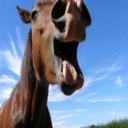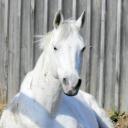Yahoo Answers is shutting down on May 4th, 2021 (Eastern Time) and beginning April 20th, 2021 (Eastern Time) the Yahoo Answers website will be in read-only mode. There will be no changes to other Yahoo properties or services, or your Yahoo account. You can find more information about the Yahoo Answers shutdown and how to download your data on this help page.
Trending News
What would you do if your horse was choking?
We had a VERY bad episode of choke this weekend with one of my horses. I was wonder what other people out there do when their horse chokes?
Mind you this horse has only done this 1 time before and we have taken every precaution that the vet has given us to prevent it, but he still thought the world was gonna end 30 seconds after he was fed and he had to get it all in one bite!
No rude comments please my horse is under vet care still *the next episode of choke might very well be me when i see the bill that i am gonna get* I am just bored outta my mind sitting here at the farm and figured that i would entertain myself a bit.
Yes his case of choke was very severe and he asperiated into his lungs and got very sick. He is responding to IV and oral antibiotics VERY well and his breathing is almost normal and he is more alert and aware now.
My old mare chokes from time to time and i swear she chokes MUCH worse than he did but then again she is older and wiser and just keeps herself calm where he was freaking out just a bit and had to be sedated to calm down.
PS- he does not have any dental issues and hay is always given first ... we don't know what put the burr up his butt to eat so damn fast.
I don't think that pulling his tongue out would have helped in this case as the blockage was way down in this throat almost all the way at the end.
As far as why hay is given first ..... #1 it gives my guys something to occupy their attention while i am getting the feed ready so that are not pacing and fighting at the gate. #2 (this horse is fed in a stall) it allows him to put some food in this stomach so that he does not think he is STARVING (cause my guys act like they have never been fed before every morning and evening) so he takes his time getting to the grain.
13 Answers
- gallopLv 71 decade agoFavorite Answer
When horses choke, they can still breathe. When humans choke, the trachea (airway) is obstructed. When horses choke, the esophagus (passage for food to the stomach) is obstructed. They are not at all the same conditions, and are not treated in the same manner.
There is the risk that food and saliva that is regurgitated from the spasming esophagus might be aspirated into the airway during an episode of equine choke, which then could obstruct breathing and also produce aspiration pneumonia.
When a horse is choking, you should get the vet involved asap. You should try to keep him quiet and get him to stand with his head down which may reduce peristaltic spasms and allow for the trapped bolus of food to be regurgitated from the esophagus, and this position will also reduce the risk of aspiration. You should not massage or try to lavage it yourself which can end in disaster. The vet can administer antispasmodic and antiinflammatory meds if necessary to allow safe passage of a catheter and irrigation and removal of the obstruction without risking rupture of the esophageal wall or aspiration pneumonia.
Sometimes the impacted feed will break apart and pass to the stomach before the vet arrives, which is fine if it happens. But there may be residual damage to the esophagus that leave the horse prone to more episodes, so treatment may still be required along with modified diet and feeding practices.
Anyway, I always advise having a vet exam performed anytime there is a choke of any significance, even when it resolves spontaneously.
*******************************************************************
*******************************************************************
Add......
Hay should be fed before hard feed because chewing on hay stimulates secretion of copious amounts of saliva which lubricates and protects esophageal and stomach mucosa, also buffering digestive acids. When concentrated feeds are ingested, they are not chewed long enough to produce sufficient saliva, so that the bolus of feed entering the esophagus is not adequately mixed with saliva, lubricated and moistened to ease passage to the stomach. Even when hard feed is not bolted, it still isn't chewed long enough to stimulate adequate saliva secretion. So, all concentrated feeds pose the risk of choke simply because they allow too much volume of feed with too little lubrication to enter the esophagus.
By always feeding hay before offering concentrates, literally gallons of lubricant, alkaline saliva will already be present to facilitate passage of the hard feed to the stomach. While making hard feeds into mashes can be one means to reducing the risk of choke, it is not desirable to feed every meal as a mash if it can be avoided, and offering forage which promotes normal digestive function is a better solution when possible.
As for advice to pull the tongue out when a horse is choking, this is not smart and can actually open the epiglottis to cause aspiration of saliva and foodstuff into the trachea.
Source(s): Registered nurse and 57 years with horses - Anonymous6 years ago
This Site Might Help You.
RE:
What would you do if your horse was choking?
We had a VERY bad episode of choke this weekend with one of my horses. I was wonder what other people out there do when their horse chokes?
Mind you this horse has only done this 1 time before and we have taken every precaution that the vet has given us to prevent it, but he still thought the...
Source(s): horse choking: https://biturl.im/NB7Ov - 1 decade ago
Curious as to what the vet recommend as prevention in addition to feeding hay first. There may be some more knowledge in there to share with us. The most typical preventatives I've heard are use a number of rocks (like 3/4 of a layer) in the feed bin to slow the horse from grabbing big mouthfuls and decrease the amount of grain fed in one meal when possible. Grain chokes are the most common when the horse bolts his food. Additionally, my vet has shared to wet the feed with a fair amount of water as this helps reduce the likelihood of choke. I had a bad case of choke in a new horse who was probably bolting his food due to anxiety of being new. Since then I've followed some simple preventatives and haven't had an issue.
I've started feeding heavily water soaked beet pulp with a moderate amount of grain for the evening meal and have not had a case of choke or impaction colic since. The added 2 quarts of water I think helps the digestive tract stay clear and moist. The horses typically eat about half their beet pulp mix, start nibbling their hay, and go back and forth between the hay and beet pulp as they eat.
Typical treatment is with hold all food, have water available, run call the vet, go back and keep the horse calm and as relaxed as possible. I don't mess with their heads but allow them to hold it where it's most comfortable at the moment and do what they need to do to relieve themselves. Most horse do sort of stick their heads out and down (horses are so smart!), blink their eyes quite a lot, and sometimes flip their faces a bit. Choke often resolves before the vet gets there but it's still worth calling to get them on the way in case they need to be tubed.
Source(s): QH Lover I'm jealous. Does your dad want more children? I'm good at cleaning up my room and staying out of trouble most days. - Starlight 1Lv 71 decade ago
Call your vet, because choke can be serious or even fatal if it isn't treated. We had a mare that used to choke periodically, and the only solution to it is to try to stop them from bolting food without chewing it. It's also important to make sure that horses are free of DENTAL problems, because they can contribute to choke. A horse that can't chew because of mouth pain is much more vulnerable. Feeding horses at regular, predictable times also helps prevent problems like this, because the horses are frantic with hunger. It's also a good idea to follow the old rule for feeding, which is to water before feeding and to give hay before you give grain. Letting the horse eat hay first means they aren't as hungry, and that may induce him or or her to eat more slowly.
Source(s): Personal experience- we had a mare that used to choke every now and then, and these are some of the things we did to help her. - How do you think about the answers? You can sign in to vote the answer.
- Anonymous1 decade ago
We lost a horse to choke. He was in excellent health and one day he started choking. My dad is a vet, so he cleared the blockage and put him on a soaked senior feed to prevent it. He choked again and again. My dad was able to clear it a few times, but at one point we had to haul him to the university, but they got it out.
He started dropping weight and just looked so sad and uncomfortable. We made the difficult decision to put him out of his misery.
A few hints
1) Feed some sort of mash or soaked feed and soaked alfalfa cubes, not hay.
2) Choke is a serious issue that usually gets worse over time. The more times a horse chokes, the more likely he is to choke again, so keep an eye on him.
3) It may be time to start thinking about what you will do if the blockage can't be cleared next time. I don't want you to poison your time with him by worrying about this, but you do need to mentally prepare yourself for that type of situation, because it may happen.
Source(s): owner/rider - 1 decade ago
Call the vet, offer small amounts of water, maybe even attempt to massage it by hand along the throat, but I would worry about damaging the esophagus.
I actually had this happen one time with a horse whole wolfed down his grain. He started choking and even slowly fell to the ground. I was just a little girl, and this was my horse, so I was hysterical. But I ran to the house and told my mom to call the vet. By the time I ran back to the barn, he was okay and must have managed to get it to pass on his own. I was so worried he was going to die.
From then on, I broke up how much of his grain he got at once by putting large objects in it lol.
- ?Lv 41 decade ago
When a horse chokes, there isn't a lot you can do. In every episode of choke I have seen (an older horse chocked on an apple he tried to swallow without chewing, another horse got into dry beet pulp and it expanded in his esophagus, and another choked on a few dry alfalfa cubes) the horses were put in their stalls, all food removed, and allowed to slowly pass what they where choking.
I have never witnessed a choke bad enough that it has completely obstructed a horse's airway, in that case I would imagine you would immediately call the vet.
- 1 decade ago
Another quick tip;
Administer oil (such as cooking or vegetable) with a turkey baster or large syringe with needle removed as you would worming paste to aid in the swallowing.
Gently massage the gullet and wait for the vet to arrive.
Some horses are more prone to choke and therefore require special procedures to be followed in order to prevent recurrence.
One of the most common causes of choke is related to bolting feed.
As above answerers have mentioned the use of stones in the feed bucket can prevent bolting.
A muzzle fitted can also make the horse work for his food and prevent bolting.
Hay can be watered down to make it dust free and more easily swallowed.
Be sure to follow directions if using beet pulp to ensure the feed is fully absorbed the water.
Good luck with your guy and hopefully he will be fully recovered soon.
- 1 decade ago
The place where we board my horse is wonderful. The person that lives there is a vet. One time my horse was choking on a alfalfa cube, and she said she immediately opened her mouth and pulled her tongue out. My horse stopped choking and it works. She told us that if we ever see a horse choking to do that.
Hope it helps!
- KaylaLv 41 decade ago
Oh, thank God, when I first saw your question I thought you were a troll. Phew.
I have never had a medical emergency with my horse yet, *knock on wood* but if/when I do, I will call the vet immediately and follow her instructions. I'm not sure if I would trust my own opinion in a bad situation because I don't always function well in times of stress.





